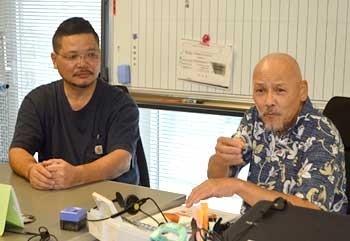Okinawa Deaf Association asks prefectural government to enact ordinance on sign language

At the Okinawa Prefectural General Welfare Center in Shuri, Naha City, Tatsunobu Nohara (left), president of the Okinawa Association of the Deaf, and Tsuyoshi Higa, an administrative director of the association, explained the situation for deaf people.
November 14, 2015 Ryukyu Shimpo
The Prefectural Assembly has been working to enact an ordinance for sign language. The assembly aims to submit a proposal at a regular meeting next February and plans for an exploratory committee to exchange opinions with concerned groups and make an inspection of advanced regions. On October 20, Tatsunobu Nohara, president of the Okinawa Association of the Deaf, explained the situation for the hard of hearing to members of the committee.
According to Nohara, compared to other countries, sign language is not widely recognized as “language” in Japan. He said, “While multi-ethnic nations tolerate various languages, Japan lacks an affinity for multiple languages.”
The Association’s Administrative Director Tsuyoshi Higa, who received the same education as physically unimpaired people, pointed out that education in Japan does not deepen understanding of disabilities. Higa explained, “History textbooks teach us stories about unimpaired people only. School education is important to establish the basic understanding of disability.”
Textbooks are not the only problem. There is presently no curriculum for teachers newly posted at the Okinawa School for the Deaf to learn sign languages. Therefore, they learn sign language on their own. But at the end of the two years it takes to memorize the sign language, they are likely to be transferred. Therefore, the best-qualified teachers are not able to stay at a school where their skills are needed.
Higa said, “With teachers who do not know sign languages, students’ learning also becomes imperfect. Without academic achievement, students have difficulties to develop social skills. It relates to why there is a poor employment rate for the deaf. “
Nohara said, “Recognizing sign language as language is not enough. It is important to create an environment for deaf people to have a comfortable life without troubling with their disability. As in the way English is taught in regular schools, it is necessary to teach sign language. I hope the ordinance for sign language will become the start of this.”
(English translation by T&CT and Megumi Chibana)
Previous Article:1,000 people gather in front of Camp Schwab gate to celebrate 500 days of sit-in
Next Article:OIST president wins physics prize
[Similar Articles]
- Endangered Languages Summit in Okinawa to discuss 8 UNESCO-listed languages
- Ryukyuan Heritage Language Society suggests Okinawa include Ryukyuan languages class in education at schools
- Peace education workshop for Nakagusuku Village K-12 faculty takes place at war site
- Ryukyu Shimpo and University of the Ryukyus hold newspaper course
- Okinawan municipalities conduct Japanese language assistance for students with foreign citizenship
 Webcam(Kokusai Street)
Webcam(Kokusai Street)


